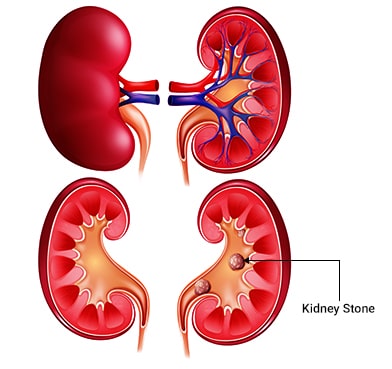Kidney stones are a common concern for many individuals, and they cause severe pain if not treated timely. Untreated kidney stones can also lead to other complications, such as infection or blockages in the urinary tract. That is why seeing a urologist and staying informed on the best treatment options for kidney stones is vital. If you ever experienced a kidney stone, you must know how uncomfortable it would have been. Fortunately, several kidney stones pass on their own. However, sometimes you need to seek the help of a urologist to learn about the effective kidney stone surgery in Delhi available. This comprehensive guide will detail kidney stones, the signs that indicate their presence, and the effective treatments available for treating them.
What are Kidney Stones?
Kidney stones are hard deposits of minerals that occur within the kidneys. They can pass through the ureter, the tube that connects your kidney and bladder. When a kidney stone enters your bladder, you normally pass it when you urinate. However, a kidney stone can become stuck in the ureter, obstructing urine flow and causing discomfort.
When to See a Urologist For Kidney Stones?
Kidney stones are not always painful. Some smaller stones that form in the kidneys pass through the urinary system without causing any symptoms. However, some larger stones can cause symptoms ranging from mild discomfort to intense pain. Following are the symptoms of kidney stones that warrant a visit to a urologist:
- Pain while urinating
- Smelly urine that appears cloudy
- Red, pink or urine that is brown in colour
- Pain in the back or sides
- Nausea
- Vomiting
- Fever
Although, the symptoms mentioned above may not need immediate medical attention. However, if you experience these symptoms, you should seek the help of the best urologist in Delhi, like Dr. Niren Rao, right away.
How to Treat Kidney Stones?
There are many ways of treating kidney stones. Individuals with reoccurring kidney stones can take preventative steps such as:
- Drinking plenty of water, as it helps to flush the stones out of the body.
- Maintaining a diet low in oxalate-rich foods to avoid further issues.
If an individual experiences a small kidney stone, then treatment includes:
- Drinking plenty of water to flush the stones through urine.
- Over-the-counter medicines such as ibuprofen help to minimise the pain.
- For severe discomfort, medications to provide relief can be prescribed by the urologist.
- If the stone is not passing, other medications can be prescribed.
However, if the kidney stones are larger, urologists recommend other procedures, such as percutaneous nephrolithotomy (PCNL) and retrograde intrarenal surgery (RIRS). Let's take a close look at these methods for treating kidney stones.
1. Percutaneous Nephrolithotomy (PCNL): If the size of the stone in the kidney is more than 2 cm, urologists recommend percutaneous nephrolithotomy. The urologist uses a nephroscope to break the stones into smaller particles during this procedure. Towards the end of the procedure, the doctor places a DJ stent and a nephrectomy tube. With this surgery, the patient experiences less post-operative pain and minimal bleeding.
2. Retrograde Intrarenal Surgery (RIRS): Patients with stones as small as (15-20mm) or smaller are suggested to undergo RIRS. This procedure introduces a scope from the urethra directly into the kidneys. Once it is inside the kidney, the stone is fragmented with lasers. With this surgery, the hospital stay is short, and the patient recovers faster.
What is the Cost of Kidney Stone Surgery?
The cost of kidney stone surgeries varies depending on factors such as the type of procedure performed and the size of the stone. At renowned urology hospitals, such as Delhi Urology Hospital, the cost of kidney stone surgery ranges between Rs. 35,000 and Rs. 60,000. PCNL surgery ranges between Rs. 35,000 and Rs. 40,000, whereas RIRS starts at Rs. 60,000.
Final Takeaway
None of the symptoms listed above for kidney stones should be ignored. Depending on the severity, contact your urologist immediately if you experience severe pain or notice some unusual symptoms. You can consider consulting Dr. Niren Rao, a famous urologist at Delhi Urology Hospital, a prestigious urology hospital in Delhi. The expert urologist will determine the patient’s overall health and recommend kidney stone treatment accordingly.
He specialises in treating kidney stones with medications. However, if the stone is large or does not go away through urine, he suggests advanced procedures such as PCNL and RIRS.
To learn more about these effective kidney stone surgeries, visit Delhi Urology Hospital.

Comments